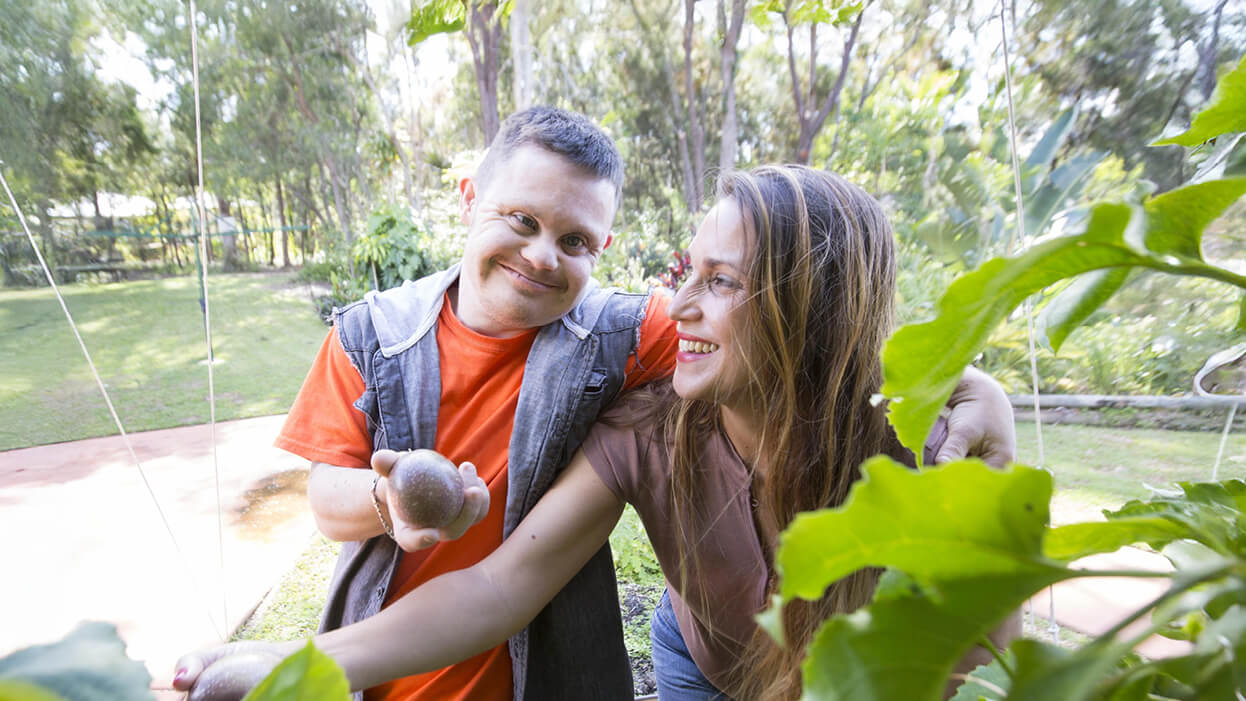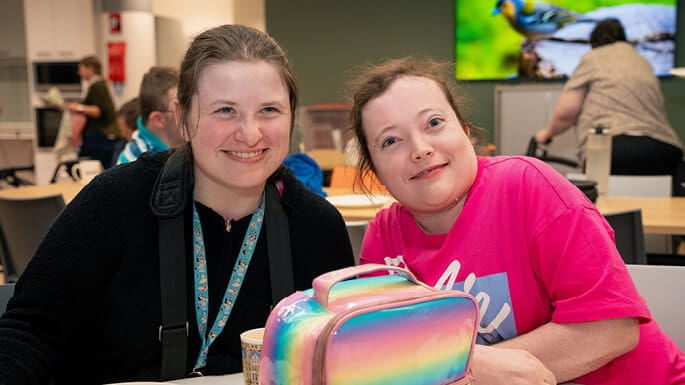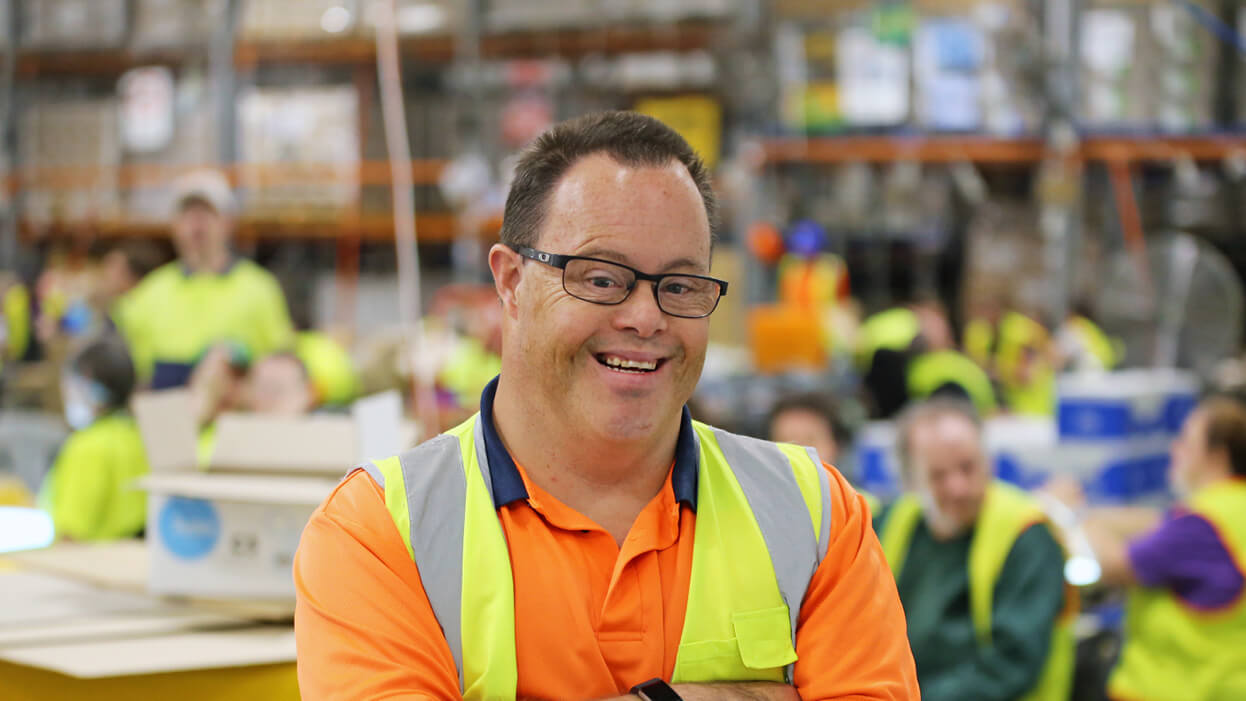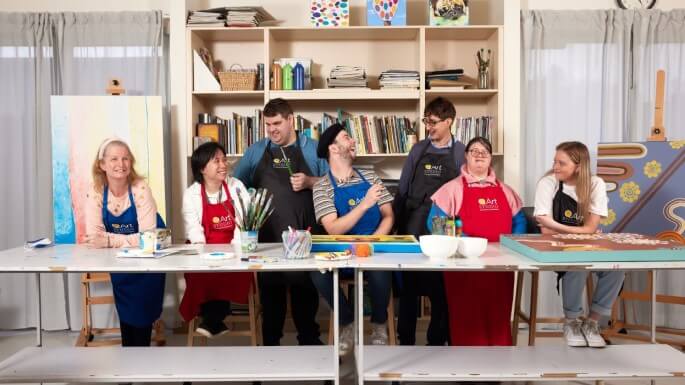Support Coordinator FAQs
Find answers fast with our Support Coordinator FAQs and empower your role to provide the best support for your clients.
Your Commonly Asked Questions Answered
Our questions come directly from Support Coordinators and answered by our expert team. Your most common questions relate to:

Have another question not listed above? Contact us and we will answer your question and add it below to help your fellow Support Coordinators find all the information they need.
Need more resources? Explore the Support Coordinator hub.
FAQs - Employment Opportunities for Your Client
Is Your Client Looking for a Job They’ll Love?
A job provides much more than just a place to work and earn money. It’s also a place where the people we support can make friends, learn skills, gain independence, and achieve goals. As an established disability employment provider, we have a range of work and training options designed to help your clients reach their career goals.
Find out about Our approach to Work Services and start your client on their journey to independence.
FAQs - Finding Your Client a Home
Why Choose Supported Independent Living (SIL) With Endeavour Foundation?
At Endeavour Foundation, your clients can live the life they want in a home they love. As a registered disability accommodation provider and a leader in our field, we have helped countless people with disability turn their dreams of living independently into a reality.
We offer accommodation with SIL at more than 160 homes along Australia’s eastern seaboard, supported by dedicated staff who are available 24/7. Our SIL services are available across Queensland, Sydney and Melbourne.
For more information, enquire now.
How Does My Client Start Their Specialist Disability Accommodation (SDA) Journey Through Endeavour Foundation?
If your client has SDA funding in their NDIS plan, and is ready to start their independent living journey, you can support them through the following steps:
- Search our home vacancies in their preferred area to find a home your client likes.
- Arrange a visit to the home for you and your client, to meet the housemates and staff.
- If your client is keen to move in, you will need to complete the final assessments. This will include working with an Occupational Therapist to assess the living arrangement requirements.
- Together, you and your client will then create an individual roster of care.
- The next step is to arrange a convenient time for your client to conduct a meet-and-greet of their potential new housemates and support team, plus a home tour.
- If your client is happy, and the meet-and-greet went smoothly, they are ready to move in.
Note: We can provide support and guidance through this process, if needed, and can explore opportunities for your client while waiting for funding to be made available.
What’s the Difference Between Supported Independent Living and Specialist Disability Accommodation?
Essentially, SIL is the funding for support services, and Specialist Disability Accommodation (SDA) is the accommodation in which those services are delivered. Endeavour Foundation provides both. Here’s what that looks like:
As a SIL provider, we manage the supports ourselves, which means we supply the workers that support the people in the home with daily living tasks. Generally, this is all done with a focus on developing your client’s skills so they can live as independently as possible. We provide SIL services throughout Queensland, Western and Northwest Sydney and East and Northeast Melbourne.
Also, as an SDA provider in Queensland, we also look after the house itself – as in the physical structure, similar to a landlord or property management agency. SDA is generally only used when someone has very high needs or “extreme functional impairment”. It’s designed to make sure people don’t have to pay more for their home because of their disability. It’s important to note that only a very small percentage of NDIS participants will get SDA funding in their plan.
What Does the NDIS Pay For, and What Will My Client Have to Pay For?
Essentially, NDIS funding covers the support the person needs to live independently, while everyday living expenses remain the individual’s responsibility.
Think of it like this: would someone without disability be expected to pay for it? If so, chances are it won’t be covered under the NDIS.
The NDIS is designed to make sure people don’t have to pay more for their home because of their disability. In most cases, your client will pay for rent and board, just as someone without disability would be expected to pay for these costs.
What Is Covered by Rent and Board?
Expenses included in rent and board are:
Rent, household groceries, bills (including internet), basic kitchen appliances, furniture in shared spaces, shared devices (like a TV).
Expenses not included in rent and board are:
Independent activities outside the house, medications/medicated or specialised groceries, personal subscriptions (like Netflix), specialised kitchen appliances, furniture in your client’s bedroom, personal devices.
How Will My Client Organise Meals and Cooking?
This is something that differs from home to home. That’s because different homes have different preferences. The decision on how this works is up to the housemates.
Most housemates choose to meal-plan, shop, cook and eat together. Sometimes they like to make a roster and sometimes it’s a whole group effort. Dietary requirements and allergies are always factored in. While support is always readily available, it’s the housemates that get to make these decisions, not the support staff.
Of course, if someone in the home prefers to do their own shopping and cooking, that is perfectly fine, and the house will most likely be able to cater to this.
How Will My Client Join In With Household Group Activities?
We get this question a lot! It depends on whether everyone in the home is doing the activity or not.
If everyone in the home is doing the activity, then the support costs for that activity would theoretically be covered under SIL funding.
If everyone is not participating in the activity, it most likely won’t be covered under SIL funding. This is because the SIL supports are primarily based in the home, and if there were any housemates in the home the support staff member would need to remain there.
That’s not to say the housemates can’t do that activity though. It would mean they would have to use some of their other NDIS funding for community access.
Can My Client Still Use Their Own Support Worker?
Absolutely! If their support worker is not being paid from their SIL funding, they can use any support worker they like. This is often the case for things like community access. The support worker does not need to be an Endeavour Foundation employee, even if the support is taking place inside the home.
If the support worker is being paid from their SIL funding, it will be an Endeavour Foundation employee supporting them.
What Is an Individualised Living Option (ILO)?
Individualised Living Option supports are an alternative to SIL. Like SIL, ILO is not the home itself; it is the supports your client receives to help them live as independently as possible.
ILO is a support package that will help your client work out how they want to live, where they want to live, and who they want to live with. With ILO, your client can share their home with friends or housemates. They also have the option to live on their own with the supports they need.
It is important to note that SIL and ILO supports can’t be funded together at the same time.
FAQs - Learning and Lifestyle Options for Your Clients
What Is an Endeavour Foundation Learning and Lifestyle Hub?
Learning and Lifestyle hubs are a dedicated spaces where people with disability can engage in a variety of activities and programs aimed at promoting learning, personal development, and social inclusion. A variety of person-centred programs are available. The programs are tailored to the participant's goals and support needs.
What Types of Activities and Programs Are Offered at the Learning and Lifestyle Hubs?
Activities and programs may include educational workshops, Virtual Reality learning, Thrive Learning, arts and crafts, recreational outings, social events, health and fitness classes, and life skills training.
What Are the Benefits of My Client Participating in a Learning and Lifestyle Hub?
Participants may develop communication skills, social skills, vocational skills, self-care skills, and life skills such as budgeting, cooking, and time management.
Can My Client Just Join a Learning and Lifestyle Hub, or Is There an Eligibility Criteria?
Clients need to be over 14 years of age and complete an onboarding assessment of needs to ensure compatibility and safety requirements can be met at the hub.
What Is the Timeframe for Getting My Client Into a Learning and Lifestyle Hub?
Once all information has been received for onboarding and funding is confirmed, the client can start in the hub within a week.
Does the Learning and Lifestyle Hub Integrate With the NDIS Framework and Support Plans?
Our Learning and Lifestyle hubs work collaboratively with NDIS participants, Support Coordinators, and other stakeholders to align activities and programs with your client’s goals outlined in their NDIS support plans. A variety of person-centred programs are available tailored to the participants goals and support needs. Regular reviews of client goals are completed to ensure we are growing with the client’s needs.
Can Participants Access Transportation Services to and From the Learning and Lifestyle Hubs if Needed?
Yes! Depending on the location, Endeavour Foundation can provide transportation assistance or facilitate access to community transport services for people who require support to attend the hubs.
What Are the Hours of Operation for the Learning and Lifestyle Hubs?
Hours of operation vary from location to location but typically include regular workday hours with flexibility to accommodate participant schedules and preferences. Please click on Learning and Lifestyle hub to find a hub near your client. Subject to demand, extended hours are available in some locations.
Are the Staff Members at the Hubs Trained and Qualified To Support People With Disability?
Endeavour Foundation staff members receive specialised training in disability support, communication techniques, behaviour management, first aid, and relevant certifications to ensure they can effectively support participants.
Will the Learning and Lifestyle Hubs Collaborate With Me in My Client’s Care?
The hub maintains open lines of communication with Support Coordinators and service providers to share progress updates, coordinate care plans, address any concerns, and ensure continuity of support for participants.
Can My Current Support Worker Support Me at the Hub?
Endeavour Foundation employs a cohort of highly trained individuals who provide support at our hubs. These employees will support your client at their chosen hub.
FAQs - Transferring Clients to Endeavour Foundation
How Can I Ensure Endeavour Foundation Is the Right Fit for My Client?
We ensure we’re the right fit for your client by offering tailored support through our dedicated teams, including our Advocacy and Complex Support Teams, who work closely with Support Coordinators to achieve the best outcomes. With more than 70 years of experience advocating for people with disability, we’ve built a legacy of trust and expertise, making us a reliable partner in supporting your client’s unique needs.
Here is where you can find more about our services, and if you’d like to discuss further, here is a link to our enquiry form or you can give us a call on 1800 112 112
How Do I Begin the Process of Transferring a Client to Endeavour Foundation?
Start by assessing the client's current needs, goals, and any issues with their current provider. Understanding the reasons for the transfer is crucial for making appropriate recommendations.
You can find more about home services, community services and work services. We have a specialised intake team that can support the assessment of your clients’ needs and goals.
If you’d like to discuss further, here is a link to our enquiry form or you can give us a call on 1800 112 112.
What Happens During the Initial Consultation With Endeavour Foundation?
We can meet with you at your convenience to discuss your client's needs, goals, and expectations. This allows the client to ask questions, express concerns, and assess whether Endeavour Foundation is a good fit for them.
Will My Client’s NDIS Plan Need To Be Adjusted?
If necessary, your client's NDIS plan may need adjustments to accommodate the change in service providers. We'll work with you and your client to ensure funding is allocated appropriately to support the transition.
Is There a Plan for Transitioning Services?
Yes, a transition plan will be developed in collaboration with your client, us, and any other stakeholders. This plan outlines steps, responsibilities, and timelines for transitioning services.
Who Oversees the Implementation of the Transition Plan?
As your client’s Support Coordinator, you will oversee the implementation, ensuring all parties adhere to the agreed upon timeline and the process is conducted smoothly. We'll also monitor the client's progress and address any potential issues that arise.
What Happens After the Transfer Is Complete?
We'll follow up with your client to ensure the transition has been successful and your client's needs are being met. Any remaining issues or adjustments needed will be addressed promptly.
By following these steps, it will facilitate a seamless transition for your client to Endeavour Foundation services, ensuring continuity of care and support under the NDIS framework.
FAQs - Endeavour Foundation Quality Assurance
How Does Endeavour Foundation Ensure Quality Care to the People We Support?
The people we support and their human rights are at the heart of all we do. We are committed to ensuring safe, high-quality, individualised service for the people we support and encourage feedback from anyone connected with our services.
This is outlined in our quality, safety and you booklet and feedback and complaints resources available on the Our commitments page.
How Can Stakeholders Provide Feedback for Improvement?
If you are connected with a person we support, please take a look at our resources. We welcome your feedback about our service. There are many options to give feedback detailed on the Feedback and complaints page of our website.
These resources are regularly shared with people we support and their families and carers, encouraging open, two-way communication to ensure continuous improvement of the quality and safety of our person-centred services.
By fostering positive partnerships with people we support and their families and carers, we can make possibilities a reality!






